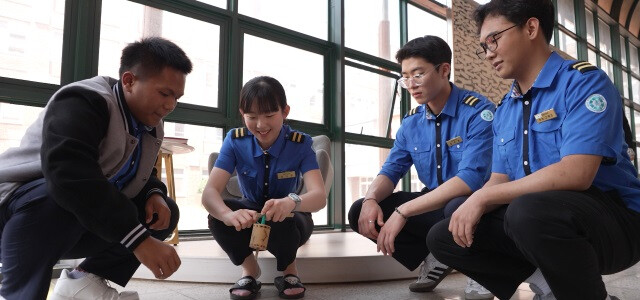
Pohang, Gyeongbuk Province – Pohang Maritime Meister High School, located in the southeastern province of Gyeongbuk, recently hosted a heartwarming cultural exchange event, bringing together Indonesian international students and their Korean counterparts. This initiative aimed to promote deeper understanding and appreciation of diverse cultures within the school community.
The event, part of the school's 'Multicultural Experience Week,' offered a vibrant array of activities. During lunch, students were treated to a culinary journey, savoring traditional Indonesian dishes such as Nasi Goreng (Indonesian fried rice), Sate Ayam (chicken skewers), and rich peanut sauce. This provided a delicious and authentic taste of Indonesian cuisine, allowing students to experience a new culture through its flavors. Nasi Goreng, a staple in Indonesian households, is renowned for its unique sweet and savory profile, often served with a fried egg and various condiments. Sate Ayam, marinated and grilled chicken skewers, are famously accompanied by a creamy, savory peanut sauce, a culinary highlight of Indonesian street food.
Beyond the dining hall, students engaged in interactive activities designed to enhance cultural understanding. These included OX quizzes, a popular format for general knowledge games, and traditional Indonesian games. One particularly engaging activity involved playing 'Gasing,' a traditional Indonesian spinning top game, which brought laughter and camaraderie among the students. These hands-on experiences allowed for organic interaction and fostered a sense of shared enjoyment.
Currently, Pohang Maritime Meister High School is home to 10 Indonesian international students, a testament to South Korea's growing efforts to attract foreign talent to its specialized vocational schools. These programs, often supported by provincial education offices, aim to provide international students with quality education and opportunities in fields like maritime industries, while simultaneously enriching the cultural fabric of Korean schools. The North Gyeongsang Office of Education, for instance, has actively recruited students from various Asian countries, including Indonesia, offering tuition-free education, though students are typically responsible for living expenses. Applicants usually need to demonstrate proficiency in Korean, often through the TOPIK (Test of Proficiency in Korean) exam, and meet academic requirements.
Nuno Gomes, an Indonesian student currently in his second year at the school, shared his heartfelt thoughts on the experience. "I'm delighted that I could get closer to my friends by introducing them to our games," he expressed. He also happily noted the arrival of six new Indonesian junior students this year, adding, "I'm glad six more juniors have joined us this year, and I will study even harder." His remarks highlight the positive impact of such programs on student integration and academic motivation.
A school official emphasized the overarching goal of the initiative: "Through this experience, we hope that students can naturally understand and respect different cultures, fostering a more inclusive and harmonious school environment." This sentiment underscores the educational institution's commitment to nurturing global citizens who are adept at navigating an increasingly interconnected world.
The Growing Trend of International Students in South Korean Vocational Schools
The presence of Indonesian students at Pohang Maritime Meister High School is indicative of a broader trend in South Korea. While historically, international students have predominantly pursued higher education at universities, there's a growing recognition of the value in attracting students to vocational and specialized high schools. These "Meister" schools, known for their industry-focused curriculum and high employment rates, offer practical skills training that is highly sought after globally. By bringing in international students, these schools aim to diversify their student body, prepare students for a globalized workforce, and contribute to the local economy.
Government initiatives and partnerships with foreign countries play a crucial role in facilitating these exchanges. Such programs often involve direct collaboration between Korean provincial education offices and educational institutions in partner countries, streamlining the application and visa processes for international students. The goal is to not only provide an excellent education but also to offer a supportive environment that helps students adjust to life in South Korea, including language and cultural immersion.
Promoting Multiculturalism Beyond the Classroom
The 'Multicultural Experience Week' at Pohang Maritime Meister High School serves as a model for promoting diversity and inclusion within educational settings. Beyond academic pursuits, creating opportunities for cultural exchange through shared meals, games, and interactive sessions helps break down barriers and build bridges between students from different backgrounds. These experiences are invaluable in shaping young minds to be more open-minded, empathetic, and culturally aware—qualities that are essential for success in today's global society.
By providing platforms for students to introduce their own cultures and learn about others, schools like Pohang Maritime Meister High School are actively contributing to a more harmonious and understanding future generation. These efforts go beyond mere tolerance, fostering genuine respect and appreciation for the richness that cultural diversity brings. The positive feedback from students like Nuno Gomes exemplifies the success of such initiatives, proving that shared experiences, even as simple as playing a traditional game or sharing a meal, can lead to profound connections and lasting friendships.
[Copyright (c) Global Economic Times. All Rights Reserved.]






























